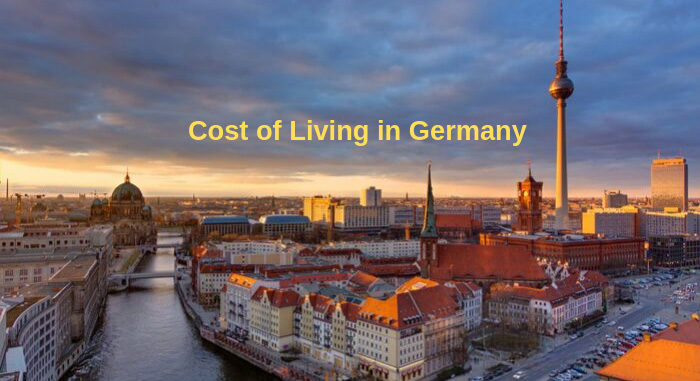Although Germany is among the richest nations globally, costs of living are not as high as anticipated and are on par with other EU nations. This motivates many professionals to immigrate to Germany from India.
When it comes to living costs, Germany is ranked 10th highest and this makes it affordable to live in the nation when compared with the UK, France, Norway, Denmark, and the Netherlands.
Immigrants will need at least Euros 1,000 monthly in Germany and this increases to Euros 1500 to 2000 in the cities having higher rent. Meanwhile, students can generally cover the costs of living for a monthly Euros 850. Even in big cities, travel is quite affordable, and drink and food prices are average for Europe.
The average cost of living in Germany
Euros 1,200 is the monthly average living cost in Germany. However, there are several factors that can impact this, specifically the location.
Overall, the monthly living costs on average for one person in Germany are as follows:
- Rent – Euros 300 onwards (student room or halls in a shared flat) to Euros 700 plus (1 bed flat in a city)
- Utilities – Euros 220 (includes Mobile, Internet and TV)
- Travel – Euros 0 (students) to roughly Euros 100
- Drink and Food – Euros 150 to 200
- Health Insurance – Euros 120
- Going outdoors – From Euros 50 to 150, depending on lifestyle
- Other – Euros 20
Total: From Euros 850 to Euros 1,500
(* Average rate for overseas students registered in the public health insurance system. The amount can be higher for others. However, this can be also covered partially by the employer and be derived directly from the gross salary).
To help you decide better to start your Germany Immigration Process, we have here outlined the costs of living in major cities in Germany:
Berlin
Although the capital of Germany, Berlin is among the most affordable cities in Germany. Prices of rent differ massively, however, the thumb rule is that the West is quite more expensive than the East.
Owing to the multicultural population, finding low-cost street food is easy. The famed Currywurst as well as open-air produce and street food markets in Berlin are quite pocket-friendly.
Munich
The living costs are higher in Munich in comparison with Berlin. It continues to be a city having a strong economy with relatively high living costs and rents in spite of its distance from northern powerhouses and provincial feel.
You may find it tough to find a 1-bed apartment for less than Euros 1000 in Munich.
Students from overseas moving to Munich must aim to get student accommodation to lower costs. As these spaces are hugely in demand, it is best to book them as early as possible.
Cologne
While Cologne is more expensive than Berlin, it is not as pricey as Munch or Frankfurt. The rent price for 1-bed flats begins at roughly Euros 800 here.
Cologne has a huge population of students and similar to Berlin has an extensive number of global cuisine restaurants. This means that while the rents are high, eating out and socializing can be affordable if you research.
Also Read : Latest Tech Blog
Hamburg
Hamburg is similar to Cologne in living costs and has marginally higher prices of rent and living costs than Berlin. The rent price for 1-bed flats begins at roughly Euros 900 here. The demand for housing and flats is high similar to Berlin due to the city being popular for young professionals and students.
Frankfurt
Second only to Munich, Frankfurt is definitely among the costlier cities to stay in Germany. However, there are some options for affordable living in Frankfurt. For example, one can relish drinks after work at a farmers market instead of a bar. This is a pocket-friendly option and is commonplace in Frankfurt.
The cheapest city in Germany
Among the major cities, Berlin is the cheapest. The capital and among the highly exciting destinations, it is not at all surprising that it is highly popular with new immigrants. Some cities that are comparable to or even more affordable are Kiel, Bochum, and Leipzig. If you are lucky and do research, you can find 1-bed flats for around Euros 500 monthly.
So with this information, you can even plan your Opportunity Card Germany application now.
The most expensive city in Germany
Usually, Munich is regarded as a highly expensive city in Germany, followed by Frankfurt, Heidelberg, and Stuttgart.
The rental prices are the chief factor for the higher living costs in these cities. You can save significant money on living costs in these cities if you can find a property or house-share in the city outskirts.
If you wish to immigrate to Germany from India as a skilled worker or student, contact the Top Immigration Consultants in India Nationwide Visas.





Comments